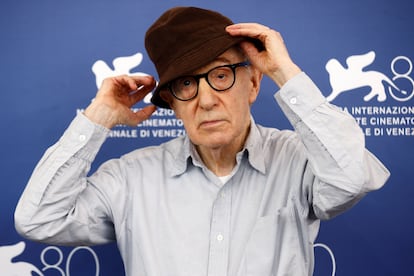Woody Allen, Sofia Coppola and Hamaguchi impress audiences at the Venice Film Festival
‘Coup de Chance,’ Allen’s 50th film, shows he still has a lot to offer, while ‘Priscilla’ presents a delicate but imperfect portrait of Elvis Presley’s marriage

Music evolves in society and cinema – the narratives no longer solely revolve around men. On September 4, Elvis Presley, the King of Rock, saw the focus shift to Priscilla Beaulieu, his wife until their divorce in 1973. Director Sofia Coppola found her story intriguing, so in Priscilla, Elvis is only seen through his wife’s eyes. “It’s really tough to sit down and watch a movie about you, your life, and your love,” said a visibly moved Beaulieu after the movie’s screening at the Venice International Film Festival. “Sofia did a fantastic job.” The idea and its execution deserve accolades, but considering Coppola’s exceptional talent, one can’t help but expect something even better from her.
Woody Allen also stood out at yesterday’s screenings. The acclaimed director is struggling to find his place in this new world, primarily because of the alleged sexual abuse of his adopted daughter, Dylan Farrow. Although a US court dismissed the case and Allen has consistently denied the allegations, Farrow has not backed down from the claims she first made 10 years ago. Many in the industry have turned against Allen, causing problems for the production and distribution of his films. The filmmaker has recently made it easier for his detractors with uneven films like Wonder Wheel and Rainy Day in New York. People began to wonder if Allen had anything left to offer, but perhaps he was simply saving up for his 50th film – Coup de Chance (Stroke of Luck, in French). While it won’t be a spectacular success, this is a highly entertaining black comedy-thriller. The audience in Venice warmly welcomed Allen, applauding him on the red carpet and at the screening.
Toxic masculinity and characters seeking to control their own destinies connect the films by Allen and Coppola, directors who are undeniably committed to quality. However, only Priscilla is competing for the Golden Lion, and we didn’t see Allen until halfway through the festival. Maybe this serves as another reminder of the long journey ahead and the gradual pace of change, although it’s definitely faster than when Priscilla and Elvis first met.

Germany, 1959. He was a 24-year-old soldier who was just starting to become popular as a singer. She was a 14-year-old girl, whose parents viewed their romance with skepticism. “It was really hard for them to understand why he was so interested in me. I think it’s because I listened a lot. He just poured his heart out to me, talking about his fears, hopes and how he couldn’t get over losing his mom. I was the one who consoled him... People think it was all about sex. No – he was kind, loving and respected that I was only 14 years old. We had the same way of thinking, you know? That was our relationship,” said Beaulieu.
All of this is in the film. One of Priscilla’s biggest wins is that it hardly includes anything about Presley’s concerts and movies, maybe because the estate that owns the rights wouldn’t allow it. Honestly, the movie is better as a result. It’s a story about a woman – her emotions, struggles and failed marriage. It’s filled with dreams, hopes and a daughter named Lisa Marie, who sadly passed away in January. But it’s also about pills, anger and rumors. Presley’s fame and ego didn’t leave much room for anything else, certainly not for sharing a life. It’s difficult to shine when your life revolves around someone else. Coppola believes that Priscilla Beaulieu has a “unique” story that is also “familiar to many young women,” which is why she hopes everyone can identify with it.

Woody Allen has an impressive resume with numerous great films. Although it’s difficult to list them all, one standout from the past decade is Blue Jasmine. After director Roman Polanski’s film disaster at the festival, people were worried that Coup de Chance would be another debacle. But Allen’s latest film was nothing of the sort. At 87 years old, Woody Allen says he wants to keep on making films wherever he can. “The location depends, “ said Allen. “Sometimes I get calls like, ‘We’ll finance a film if you make it in Icelandic.’ But I still have lots of good ideas for New York. I’ll do one if someone pays me and agrees to my conditions, namely ‘here’s the money – go do it.’”
After 50 films, he admits to having learned only a few things. Interestingly, he found that he’s better at creating roles for women rather than men. Making Coup de Chance in French was new for Allen, as was filming in Paris, Rome, London and Barcelona. “When I was younger, the films that excited us the most were from Europe. We wanted to make films like the European directors,” said Allen. “I’ve wanted to do this my whole life, even though I don’t speak French. Understanding the actors’ emotions and whether they feel authentic, can be done without knowing the language.” Allen says Coup de Chance has the same themes that have always fascinated people: “Love, intrigue, adultery, death and murder.”
Coup de Chance has an additional element – luck. The film is being likened to his 2005 drama-romance, Match Point, but this doesn’t diminish its value. It’s fresh, intelligent and engaging, with plenty of comedy, irony and twists arising from the chance meeting of two high school classmates. “Luck has a greater impact on our lives than we care to admit,” said Allen. “The best thing to do is not think about it too much and have fun.”
Ryûsuke Hamaguchi’s Evil Does Not Exist was the third feature film screened in Venice on September 4, the last stop on the film’s tour of the major European festivals after Berlin and Cannes. The Japanese director burst onto the world stage by scooping up four Oscar nominations with Drive My Car (2022), and winning for Best International Feature Film. His latest film proves that Japanese cinema is well on its way to becoming a reliable source of high-quality films. Evil Does Not Exist tells the story of a rural community resisting the arrival of glamping – glamorous camping. While Hamaguchi’s film may not achieve the complexity and ambition of Drive My Car, it showcases his subtlety and mastery of slow-paced storytelling. “It’s a very intimate story that reflects our society,” said Hamaguchi. Why? Because it’s about capitalism, pollution and well-off and uninvited urbanites invading the countryside.
Sign up for our weekly newsletter to get more English-language news coverage from EL PAÍS USA Edition
Tu suscripción se está usando en otro dispositivo
¿Quieres añadir otro usuario a tu suscripción?
Si continúas leyendo en este dispositivo, no se podrá leer en el otro.
FlechaTu suscripción se está usando en otro dispositivo y solo puedes acceder a EL PAÍS desde un dispositivo a la vez.
Si quieres compartir tu cuenta, cambia tu suscripción a la modalidad Premium, así podrás añadir otro usuario. Cada uno accederá con su propia cuenta de email, lo que os permitirá personalizar vuestra experiencia en EL PAÍS.
¿Tienes una suscripción de empresa? Accede aquí para contratar más cuentas.
En el caso de no saber quién está usando tu cuenta, te recomendamos cambiar tu contraseña aquí.
Si decides continuar compartiendo tu cuenta, este mensaje se mostrará en tu dispositivo y en el de la otra persona que está usando tu cuenta de forma indefinida, afectando a tu experiencia de lectura. Puedes consultar aquí los términos y condiciones de la suscripción digital.









































